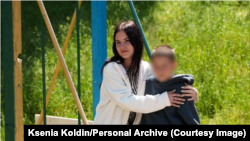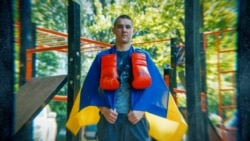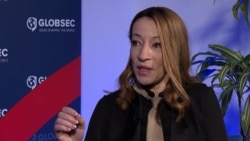When Russia launched its full-scale invasion of Ukraine in Februry 2022, Ksenia Koldin was finishing grade 11 in Vovchansk, a city some 70 kilometers from her native Kharkiv.
Six months later, with the country at war, she and her younger brother were forced to go to Russia. They weren't on the front lines, but the two some of the thousands of casualties from the conflict nonetheless.
Earlier this month, the European Court of Human Rights (ECHR) found Russia guilty of implementing an organized system of human rights violations, including the forced deportation of children.
But a new report by the global think tank Globsec goes a step further, echoing growing accusations of Moscow's aim to "steal" Ukraine's future.
"Russia’s weaponization of population displacement and the deportation of children represents one of the most deliberate and devastating assaults on a civilian population in modern European history," the report, authored by Associate Fellow Megan Gittoes, says, noting the strategy in the global context of mass refugee movements exposes millions to the risks of trafficking and exploitation.
"Far from being unintended consequences of war, these are core components of the Kremlin’s hybrid warfare strategy, designed to weaken Ukraine’s demographic resilience in what has become a protracted conflict," the report, released at the Globsec Forum 2025 last month, adds.
Amid massive drone strikes, battlefield clashes, and ruined cities, thousands of Ukrainian children have been taken from their homes and sent to Russian-controlled parts of Ukraine or locations in Russia and its ally, Belarus.
Some have been placed with Russian foster families or at "reeducation camps" while many others like Koldin, went to school -- in Russia.
There, she recounts experiences that come across more as indoctrination than education.
“Every Monday we had 'talks about important things' lessons. This is the famous Russian propaganda about how great Russia is. Then we had to sing the national anthem," she told RFE/RL.
Koldin stayed in school for three months during which she said her teachers and the administrator of the college tried constantly to persuade her to take Russian citizenship saying she could get money and housing if she did. She refused.
Around 19,546 children have been deported to Russia since the start of the invasion in 2022, and just about 1399 children have been returned to Ukraine, according to data from Bring Kids Back UA.
Russia has been accused of changing the Ukrainian children’s names in an attempt to deprive them of access to relatives.
Mariam Lambert, co-founder of Emile Foundation that works on the process of returning forcibly deported children, says the pressure put on Ukrainian children now in Russia is a "deliberate and organized crime."
"In Ukraine, children are targeted by Russia to wipe out their identity,” Lambert said in an interview with RFE/RL.
“The whole goal is to create a new generation in Russia. And that's a crime according to the Geneva Convention.”
Moscow has denied committing any crimes with the moving of the children, says it is saving them from the war.
The International Criminal Court (ICC) sees it otherwise.
In March 2023 it issued arrest warrants for Russian President Vladimir Putin and Maria Lvova-Belova, Russia's commissioner for children's rights.
The court alleges responsibility for the war crime of the unlawful deportation and transfer of children during the war.
Ukrainian Ombudsman Dmytro Lubinets, who represents the state in efforts to bring back civilians and military personnel, says Russia hasn't been forthcoming with information regarding children from Ukraine.
“From our perspective, we clearly see the main goal of deporting Ukrainian children: to use them as the next generation of Russian soldiers,” Lubinets told RFE/RL.
“Their documents are changed, all of them, including birth certificates and education records. They are forced to speak only Russian and to identify themselves as Russian,” he added.
An investigation by Schemes (Skhemy), an investigative news project run by RFE/RL's Ukrainian Service, last December revealed Russia has been using a militaristic youth organization, Yunarmia, to foster the loyalty of teenagers in occupied parts of Ukraine and prepare them to fight in Moscow's war against their native country.
Yunarmia "was created with the specific idea of the militarized reeducation of not only Russian [children] but also Ukrainian children from the occupied territories," said Kateryna Rashevska, a lawyer at the Regional Center for Human Rights, which was forced to move from Crimea to Kyiv after the Russian occupation.
Those parents trying to find their children and repatriate them after being separated appear to back up Lubinets' claims.
The Globsec report cited the testimony of several parents saying Russian officials put up obstacles to try and make the return of children more difficult.
'Brainwashing'
One of them, a woman named Tatyana, said when she tried to secure the return of her son, who was transferred to a camp in Crimea in 2023, she was accused by Russian officials of acting on behalf of Ukrainian intelligence and detained her for several days.
Koldin said she experienced another issue when trying to secure the return of her brother, now 14, after they were separated in Russia.
He had spent five weeks at a summer camp and then moved in with the new Russian family to Abinsk, a city in the Krasnodar region.
There, she said, “they started brainwashing him.”
“They said that the Nazis were operating in Ukraine, that they wanted to kill him, that no one needed him in Ukraine, that there was a war there and that he shouldn't go there,” Koldin said.
He was reluctant to go, having made new friends and fearing what awaited him in Ukraine after hearing how bad it was.
“We talked for three hours, during which I tried to persuade him to agree to go with me. He absolutely did not want to go," Koldin recounts.
"He said the same things about the Nazis being there, that he wanted to stay here, that there was a war, that they were bombing."
He finally relented, with his Russian foster mother telling them as they left: “Go, go to your Ukraine, it will soon become Russia anyway.”
Ukraine has made the return of children a key point in struggling peace talks with Russia.
Lubinets says Russian officials are reluctant to return the children "because they fully understand that every returned child is a potential witness.”
“We must acknowledge that Russian propaganda works on them every single day,” he says.
Ksenia Koldin says it took several months for her brother to re-assimilate.
She says her brother now goes to school and lives under the care of a “good Ukrainian foster family.” They both live in Kyiv and see each other on the weekends.
She also continues to fight for others who have not been as fortunate. Koldin is an ambassador for Save Ukraine, and the voice of children who were deported and had similar experiences to her.


















